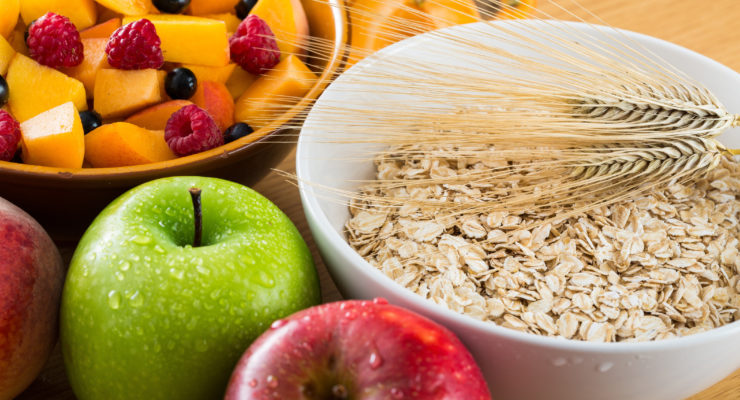Fiber and Weight Loss: The Major Connection
You’ve surely heard that fiber is good for you when it comes to a healthy lifestyle. However, you might still be wondering why you should be so diligent about including it in your diet to lose weight. We’ve rounded up the latest science and are here to tell you how fiber and weight loss are connected.
What is Fiber?

The truth is, there is quite a bit of research connecting fiber to weight loss that should be on your radar. But first, it’s important to understand what fiber is.
According to The Harvard T.H. Chan School of Public Health, dietary fiber is a carbohydrate found in plant foods like fruits, vegetables and whole grains. However, unlike other carbs, fiber is unable to be digested by the body. This causes it to pass through the digestive system without causing blood sugar to rise. There are two main types of fiber that we will discuss later.
There are some really great ways to sneak more fiber into your diet, including making simple swaps (such as switching white potatoes with sweet potatoes). These easy changes can pay off by assisting with your weight loss efforts. Medical News Today explains that consuming high amounts of fiber can “can significantly contribute toward body-weight control.”
Fiber is a Simple Solution

When it comes to losing weight, a lot of people are willing to try complicated diets. However, research shows that something super simple—eating more fiber—might be even more impactful. A study, published in Annals of Internal Medicine, looked at whether one simple change could be that powerful—and it was.
In the study, one group adhered to the American Heart Association (AHA) diet, which included shaving 500 to 1,000 calories off of their normal food intake and following some complex food guidelines. The other group was simply told to eat more high fiber foods. After a year, the high fiber group lost about an average of 4.6 pounds while the AHA group lost about six pounds. Despite eating such a strict and complicated diet which included restricted calories, the AHA group was only slightly higher. This shows that simply increasing fiber intake may be a solution to dropping pounds for those who struggle sticking to a complicated meal plan.
Fiber Reduces Appetite

One way that eating a high fiber diet may play a role in weight loss is the fact that consuming fiber can reduce one’s appetite. According to Healthline, this may be due to the reduction of the hormone ghrelin when fiber is consumed. Ghrelin is responsible for increasing hunger and appetite within the body. Similarly, it is also understood that fiber decreases hunger by slowing down the movement of food through the digestive system, says Healthline. This helps people to feel fuller for longer.
Fiber and its Correlation to Gut Health

Fiber is divided into two categories—soluble and insoluble. Soluble fiber (the kind found in oats, blueberries and beans) can dissolve in water and is said to help decrease blood sugar and cholesterol, says The Harvard T.H. Chan School of Public Health. Insoluble fiber (found in vegetables, whole wheat products and rice) is unable to dissolve in water and is associated with better bowel movements.
Both types of fiber can help with gut health balance. According to research from the University of Illinois College of Agricultural, Consumer and Environmental Sciences, both soluble and insoluble fiber helped to increase the abundance of healthy gut bacteria in study subjects. Healthline explains that because we are unable to digest fiber, it acts a probiotic that feeds beneficial bacteria.
Fiber and Belly Fat

Abdominal fat can be one of the most stubborn areas to lose weight. However, research has pointed to fiber playing a vital role in its reduction. A study, published in Obesity, found that a higher fiber intake was linked to a lower risk of belly fat. This particular research was linked directly to soluble fiber and found that eating more of it could not only help people to lose belly fat but also prevent its gain.
Making Fiber a Regular Part of your Diet

There is no question that the research on fiber is positive—but it’s not just linked to weight loss. A diet high in fiber has been shown to have other benefits such as reducing the risk of heart disease, cancer and more, says Healthline. For all of these reasons, it’s clearly beneficial to make fiber a regular part of your diet. According to the Academy of Nutrition and Dietetics, the daily fiber recommendation is 25 grams for women and 38 grams for men. Unfortunately, most people don’t get enough.
Ensure you’re getting enough fiber in your diet with a healthy meal plan from Nutrisystem! Our programs can help lose weight with a balanced diet that is high in fiber. You will incorporate more fruits, veggies and whole grains into your day and enjoy fiber-rich Nutrisystem meals and snacks. Paying attention to your fiber intake can go a long way in improving your waistline—as well as your overall wellbeing.
The post Fiber and Weight Loss: The Major Connection appeared first on The Leaf.
source https://leaf.nutrisystem.com/fiber-and-weight-loss-the-major-connection/





Comments
Post a Comment